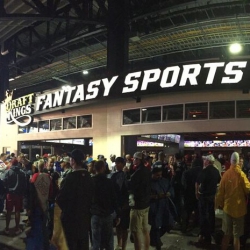After two years of debate by lawmakers, Massachusetts State Sen. Eileen Donoghue introduced a bill this week which would legalize daily fantasy sports in the commonwealth.
DFS operators would have to register with the Massachusetts Gaming Commission and pay licensing fees up to $100,000, depending on traffic. In 2016, the Massachusetts legislature agreed to temporarily make daily fantasy sports legal until July 31, 2018.
In the meantime, the Massachusetts Gaming Commission would impanel a committee to study the issue. That committee’s report was released in July 2017, with a variety of options for the legislature.
No bill was introduced in the final months of 2017, but the deadline to legalize and regulate DFS gaming in the state fast approaches.
Sen. Eileen Donoghue’s bill received praise from the fantasy sports sites which would be regulated.
Daily Fantasy Sports Taxes
Donoghue’s bill (S2273) would impose a 15% tax on DFS revenues, while lowering the tax rate on state casinos to 25%. Slot machine revenues would see their gaming tax rate reduced to 49%. The proposal is meant to avoid opposition by Massachusetts’s entrenched gaming interests.
Boston-based DraftKings and New York-based FanDuel, along with lesser known DFS companies, would have to register with the Massachusetts Gaming Commission. DraftKings and FanDuel, which control 95% of the daily fantasy sports business in the United States, would pay a registration fee of $100,000. Other operators would pay smaller fees.
In recent Massachusetts Senate hearing, Eileen Donaghue said that daily fantasy sports providers should be made legal, because of what they bring to the commonwealth. DraftKings has a workforce of 425 employees, with 700 expected in all by the year 2019. A full 600 of those jobs are based in Massachusetts, so the state senator argued DraftKings is a significant employer which should be protected.
DraftKings Praised S2273
James Chisholm, a spokesman for DraftKings, praised S2273 for bringing “certainty” to their business model. Chisholm added, “We continue to review the bill’s full implications, and look forward to discussions with her, the legislature and the governor as we adopt common sense legislation that protects consumers and allows us to continue to innovate and create jobs in Massachusetts.”
The senator said her bill strikes the right balance between protecting DFS gaming operators, while also protecting residents who engage in daily fantasy sports competitions. The bill has consumer protections and problem gaming resources instituted into the regulations.
Donaghue said at the recent hearing, “Permanently legalized DFS is not without risk, but if done right could provide unique benefits.”
DFS Links to Massachusetts State Lottery
Michael Sweeney, the director of the Massachusetts State Lottery, had asked for the bill to include certain advantages for the lottery. For instance, Sweeney wanted links from DFS sites to the Massachusetts State Lottery’s official site, as a means of free advertising.
In the committee hearings, Sweeney noted, “The Legislature ensured that the state lottery could have product placement within the physical space for casinos.”
State Rep. Keiko Orrall (R-Lakeville), who is running for state treasurer, asked why the fees are so much smaller for daily fantasy sports operators than casinos and slots parlors. Donaghue replied, “They operate on much smaller margins. When we looked at it in preparing the bill, it seemed reasonable.”
Legalizing Sports Betting
Senate Bill 2273 also includes provisions in case the US Supreme Court strikes down a federal ban on sports betting. At present, the Supreme Court is considering the arguments in Christie V. NCAA, in which the State of New Jersey is seeking to end the 25-year old Professional and Amateur Sports Protection Amendment (PASPA).
If the Supreme Court rules on behalf of New Jersey, then the bill would create a special 8-member commission to make recommendations for legalizing and regulating land-based sports betting in Massachusetts. That panel would have 120 days to make its regulations, so Massachusetts casinos and slots venues might be able to operate brick-and-mortar sportsbooks.
DraftKings and FanDuel
DraftKings’ praise of S2273 is a far cry from the company’s stance only 3 years. In 2015, DraftKings and FanDuel were in a no-holds-barred investment and advertising battle to see which would emerge as the No. 1 DFS company in America. Both gained hundreds of millions of dollars in investments from companies like Comcast, NBC Sports, and a host of Wall Street investment firms. The Disney Company talked about investing $1 billion. Sports franchises signed promotional deals, while the NBA, MLB, and NHL did the same.
Meanwhile, the two companies poured their investment cash into pervasive advertisements on TV, radio, and the Internet. Few sports broadcasts were without a DFS ad. The advertising battle caused a backlash, as late night talk show hosts made jokes about DFS and a handful of public officials expressed misgivings about DFS gaming. Then the Ethan Haskell scandal broke in October 2015. State attorneys general began to investigate daily fantasy sports, while some banned the practice.
That begin a 3-year set of lobbying efforts and legal battles for DraftKings and FanDuel. Eventually, the two bitter rivals began to coordinate their legal and legislative strategies. To pool resources for those efforts, the two even discussed a merger — though regulators found it would create a monopoly. These days, the companies that once brashly swept aside suggestions of regulatory oversight or comparisons to sports betting are all-too-happy to accept reuglations and a gaming license. Perhaps it was all inevitable, but the DFS regulations should serve customers well.

